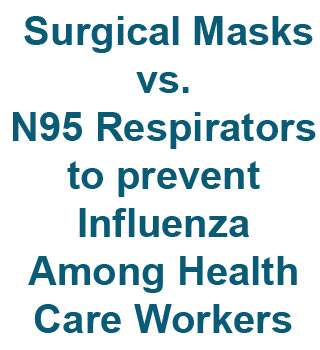
There is increased anxiety this year because of the influenza pandemic due to the H1N1 virus.
“Data about the effectiveness of the surgical mask compared with the N95 respirator for protecting health care workers against influenza are sparseâ€, the authors provide as background information. “Given the likelihood that N95 respirators will be in short supply during a pandemic and not available in many countries, knowing the effectiveness of the surgical mask is of public health importance.â€
A trial of about 446 nurses in eight Ontario hospitals was conducted by Mark Loeb, M.D., M.Sc., from McMaster University, Hamilton, Ontario, Canada, and colleagues. This trial was performed to compare the surgical mask with the N95 respirator in defending health care workers against influenza.
The nurses were divided into 2 groups. About 225 were given surgical masks and around 221 were given fitted N95 respirators which they were to wear when caring for patients with febrile respiratory illness. The principal result of the study was laboratory-confirmed influenza. Efficiency of the surgical mask was apparently evaluated as non-inferiority of the surgical mask as opposed to the N95 respirator.
This analysis was examined between September 23, 2008 and December 8, 2008.
The authors mentioned, “Influenza infection occurred in 50 nurses (23.6 percent) in the surgical mask group and in 48 (22.9 percent) in the N95 respirator group (absolute risk difference -0.73 percent).â€
This signified non-inferiority of the surgical mask. Even among those nurses who apparently had a raised level of the circulating pandemic 2009 H1N1 influenza strain, non-inferiority was apparently verified between the surgical mask group and the N95 respirator group for the 2009 influenza A(H1N1).
The authors remarked, “Our data show that the incidence of laboratory-confirmed influenza was similar in nurses wearing the surgical mask and those wearing the N95 respirator. Surgical masks had an estimated efficacy within 1 percent of N95 respirators,” the authors write. “That is, surgical masks appeared to be no worse, within a prespecified margin, than N95 respirators in preventing influenza.â€
In conclusion, the authors mentioned that their findings apply to routine care in the health care setting. They should not be generalized to settings where there is a high risk for aerosolization, such as intubation or bronchoscopy, where use of an N95 respirator would be prudent. In routine health care settings, particularly where the availability of N95 respirators is limited, surgical masks appear to be non-inferior to N95 respirators for protecting health care workers against influenza.
This study will be published in the November 4 issue of JAMA.
